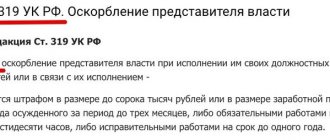The concept of insulting a government official
Hostility towards government officials can only be expressed in a correct form, regardless of the degree of your dissatisfaction with the actions of a particular person. Even if he caused you harm, expressed in serious consequences, you have no right to speak indecently to him.
You must appeal his unlawful actions in the manner prescribed by law, up to and including trial. But it is unacceptable to insult him.
A government representative is part of the state mechanism that governs the state. This is a special ideological sphere. Insulting an official is, accordingly, an insult to the system.
This point is quite fair, given that the establishment of special moral and legislative protection can harm an official , whose authority may be subject to widespread obscene attacks, which will be fraught with consequences in the form of a violation of the management system as a whole.
Responsibility for insulting a government official is provided for in Article 319 of the Criminal Code of the Russian Federation . If the subject who has been insulted is an official, and not a representative of the authorities, he is held liable for his insult by virtue of Article 130 of the Criminal Code of the Russian Federation.
Decoding concepts
Actions related to the performance of military service should be understood as:
- Taking part in hostilities.
- Perform job assignments and/or duties.
- Combat duties and outfits.
- Taking part in exercises.
- Execution of orders, instructions or assignments given to superior military personnel.
An indecent form of insult means not only obscene expressions and obscene gestures, but also other actions that do not comply with moral and ethical standards.
Insults of a general nature, i.e. those that were not intended to offend the honor and dignity of a serviceman and do not violate current moral and ethical standards, cannot be regarded as an insult.
Direct intent should be understood as the criminal’s awareness of the fact that his actions will affect honor and dignity. This means that the attacker deliberately wants to offend a colleague.
Corpus delicti
The criminality of the act consists in the use, expressed orally or in writing, of indecent or abusive language addressed to a representative of the authorities (official). Even in the case where the perpetrator expressed or expressed in writing truthful information about the victim, but it had the appearance of an insult, such actions reveal the elements of a crime.
The meaning of responsibility for this act is determined by the fact that in addition to insulting a person , which is unacceptable under any circumstances, it is aggravated by being directed at the authority that the person represents.
This discredits not only the individual, which prevents her from properly performing her assigned duties, but also the structure that she represents.
When determining the elements of a crime, there is an important aspect - the insult must be of a public nature, which, in fact, determines the fact of discrediting the power or position held by the victim.
The objective side of insulting a government official consists of social relations in which destructive forms of communication are unacceptable in order to avoid a gap in the protection of the system.
The objective characteristics of the crime include:
- The presence of government representation for the victim, or the status of an official.
- The presence of third parties, which makes it possible to determine the public nature of the crime.
- The specificity of an indecent phrase.
In addition, the objectivity of the act is established through the following factors:
- place and time;
- forms of expression;
- targeting the victim.
Persons who have reached the age of 16 are subject to insulting a government official
The subjective side of the crime contains:
- presence of guilt;
- direct intent;
- motives.
The degree of responsibility of the perpetrator depends on the type of motivation for committing the act. The consequences will be completely different in the following cases:
- When a representative of the authorities or an official provoked indecent expression or attitude towards him.
- When the person guilty of insult responded in this way to an appropriate remark.
- When the culprit interfered with the performance of the duties of an official.
- When the culprit was drunk and having fun.
The crime is over from the moment the offensive acts are committed.
Where to go to bring the attacker to justice?
You can write a statement about insulting a serviceman at any police station. However, it will be forwarded to the military prosecutor's office. Cases under Article 336 of the Criminal Code of the Russian Federation are considered by military courts. Therefore, the victim can immediately submit an application to the military investigation department or independently initiate consideration of the case in a military court.
Please note that the victim will need evidence to prove that the offense was committed.
These may include:
- Testimony of witnesses.
- Audio or video recordings of oral statements.
- Documents confirming insults inflicted in writing.
- Other evidence that will help the investigation establish that a crime has been committed.
Responsibility and punishment
Accordingly, they include all employees of state law enforcement agencies on duty and the military.
Insulting a police officer can be considered in different aspects, which have different legal content. A police officer can act in different roles. He may be insulted by:
- When he is on duty in his office, in the apartment of a suspected citizen or in a public place.
- When he is resting and not performing official duties.
Accordingly, liability is imposed when a police officer acts as a defender of law and order on the street or in another public place where his humiliation prevents him from performing his duties. In this case, obscene expressions will be considered as addressed to a representative of the authorities.
If a police officer is on duty at the police station and an insult was received in the presence of his colleagues, he acts as an official , and insulting a police officer while on duty will be punished in accordance with Article 130 of the Criminal Code of the Russian Federation . Among his colleagues, he cannot be considered humiliated as a representative of power, since in this context he does not perform such a function.
When a police officer is not on duty or on vacation, then his insult, according to general rules, will be considered in accordance with Article 5.61 of the Code of Administrative Offenses of the Russian Federation.
The fine for insulting a police officer while on duty ranges from 1 to 3 thousand rubles. Although in some cases, if the insult was inflicted in the light of previously performed duties, that is, in their context, it may be criminal. Differentiation must be made from what is the motive:
- opposition to the system of order;
- personal animosity.
For insulting a police officer while on duty , the perpetrator may be punished not only in the form of a fine, which will reach 40 thousand rubles. (income for 3 months). In addition, punishment for insulting a police officer in the form of:
- compulsory work up to 360 hours;
- correctional – up to 1 year.
Insulting a judge is complemented by another difficult point, since the criminal code provides for liability for contempt of court under Article 297 of the Criminal Code of the Russian Federation.
Contempt of court is expressed by an attempt to create disorder in the conduct of a court hearing, which may contain disrespect and indecent statements towards persons present at the court hearing.
That is, it concerns not only government officials, but also ordinary citizens who act as witnesses, plaintiffs, and defendants. Punishment is aimed at preserving the status of the judicial procedure as a form of administration of justice in general.
Insulting an official in the workplace will be punishable by Article 319 of the Criminal Code of the Russian Federation , which includes punishment corresponding to insulting other persons who are government officials. However, if the insult was not of a public or official nature, then the punishment will be imposed in accordance with Article 130 of the Criminal Code of the Russian Federation or 5.61 of the Code of Administrative Offenses of the Russian Federation.
Arbitrage practice
The police were called to the hostel to restore order. Subsequently, one of the riot participants, being drunk, met a police officer on the street. He was in civilian clothes and was resting after work.
The attacker began to insult him, recalling the case when he and his friends were charged with sanctions for disorder in a public place. The court hearing determined not an administrative offense , but guilt in the form of criminal liability, since the insult concerned the performance of the police officer’s duties.
At the court hearing, the excited defendant, who had to repeat the same information to the judge twice, asked her a question: “Do you have sclerosis?”
Since the judge was not young, she was greatly offended by the remark. Responsibility for insulting an official arose under Article 319 of the Criminal Code of the Russian Federation.
In a medical sobering-up station, a citizen obscenely insulted a police lieutenant, a young woman. The claim for insulting a government official was rejected due to the fact that in this case only employees of the medical sobering-up center were present during the insult, and the principle of publicity was not demonstrated. In this case, the insult initially had to be qualified under Article 130 of the Criminal Code of the Russian Federation .
A government representative can act in different social roles, which determine the degree of his protection in society. In order to achieve justice and punish the offender, a representative of the government must correctly navigate the context that determines for him the protective properties of the justice system.
How do insults affect a child's personality?
The impact of insults on a child’s fragile psyche cannot be underestimated. The most destructive for personality development, the formation of self-confidence and adequate self-esteem are such types of humiliation as:
- obscene language directed at a minor;
- comparison with other children while simultaneously making offensive assessments of mental or physical abilities;
- making fun of physical disabilities;
- physical influence in the form of slaps on the head, slaps in the face, which is carried out not for the purpose of beating, but with the intent to offend and humiliate the child.
As a result of such parental behavior, the child may become cowardly and withdrawn, or angry and aggressive.
If a child is insulted by his peers, this also leads to negative consequences for his self-esteem. Most often, the child in this case begins to insult his offenders in response. The task of adults is to ensure that he is not afraid to talk about what is happening. It is necessary to explain to the child that it is necessary to deal with insults in legal ways, and not to respond with aggression. Adults, for their part, must do everything possible to stop illegal behavior.







